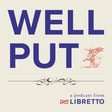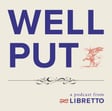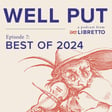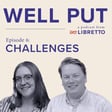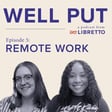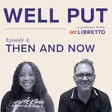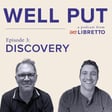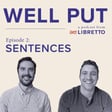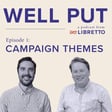Become a Creator today!Start creating today - Share your story with the world!
Start for free
00:00:00
00:00:01

Episode 11: Workshops
Once a messaging platform is complete, the time comes to put it to use. Join Nancy Boissonnet and Adrian Pio as they share Libretto's approach to putting the messaging to use via workshops that teach organizations how to share compelling, authentic stories with a unified voice.
Mentioned in this episode:
- Project: United Way of Central Maryland
- Project: Dartmouth Health
- Taylor Swift and Travis Kelce: engaged!
- Big Money (album) by Jon Batiste
- The Bear (TV Series)
Hosted by Nancy Boissonnet and Adrian Pio
Produced and Edited by Tiffany Carlson
Music by Coma-Media, via Pixabay
© 2025 Libretto. All Rights Reserved.
Recommended
Transcript
Introduction to Hosts and Podcast Focus
00:00:13
Speaker
Welcome to Well Put, a podcast about communications for mission-driven organizations from Libretto. I'm Nancy Boissanet, Libretto Senior Strategist. And I'm Adrian Pio, a Senior Creative Lead here at Libretto.
00:00:25
Speaker
Today, Nancy and I are going to be talking about our approach to workshops. What is the role of a messaging workshop? What can you use the workshop to accomplish? How do you go about putting one together? And what is the ultimate takeaway that you're hoping to inspire as you deliver a workshop?
00:00:41
Speaker
And we'll tell you some behind the scenes outtakes of what it's like for us when we put together those workshops and how we get to the workshop that we ultimately deliver.
Nancy's Teaching Background and Workshop Passion
00:00:49
Speaker
Nancy, you're sort of the workshopper in chief at Loretto, I would say.
00:00:56
Speaker
um i know during your sabbatical, you spent a fair amount of time delivering and honing your craft on workshops. And even before you left, we you and I actually working together had a chance to do several workshops, which I thought were pretty effective.
00:01:08
Speaker
um what What about it is is most exciting for you? Why are you into the workshops? I mean, I came to libretto from teaching. So I was an academic who didn't really love doing research, but I loved teaching.
00:01:23
Speaker
And being in a classroom is one of my favorite places to be. I actually spent a fair amount of time during my sabbatical in France teaching um a college class on narrative, which was really fun too. and pulled lot of the same skills that I need to do workshops.
00:01:43
Speaker
That interactive piece, really trying to kind of tap into student interests and find out what they're excited about and how to engage them around the things that they show interest in. We do sort of that same exercise when we do a workshop at Libretto.
00:01:59
Speaker
It really is bringing people into a room and getting them to talk about what they care about. um So for me, workshops really tap into that that love of teaching that I have. And you know i think for us, it's also a really great opportunity to think about our work differently.
Transforming Messaging into Dynamic Conversations
00:02:18
Speaker
So you know you put it down on the page and then you see it in action. And we always leave these workshops with all of these stories and new perspectives And we get some of that during discovery, but I'm always amazed at the extent to which the the training allows us to take the messaging and it goes from being words on a page to being this living, breathing thing that people are actually using and interacting with. So for me, I think that's the most interesting part of the workshop.
00:02:50
Speaker
Yeah, I totally share your love for teaching in the abstract. at As you will know, as our listeners may not, I did spend a year working in a third grade classroom, not as the primary teacher, but in an educational capacity. And it was a lot of work and a lot to manage. And kids are a handful.
00:03:07
Speaker
So very happy to be doing this in a more professional context. the communications staff and and employees who are excited and engaged often to be there and and hopefully when they leave excited about the work that we've put together and shared with them. But it is really exciting to say, and you know, to use that moment to bring somebody into something that you care about and to share that enthusiasm and excitement and often curiosity with them so that they gather a little bit of what makes it special from you and and also from the client team as well um to give those folks a chance to say to their
00:03:41
Speaker
constituents, their stakeholders, here's the thing we've been working on that we're really proud of and that we want you to adopt. I think ultimately the purpose of a workshop as i see it is to make sure that our messaging has life and legs outside of the engagement process.
00:03:54
Speaker
and We want people to use these documents. They're robust, they're comprehensive. We put a lot of time and effort into them. And our absolute fear is that they won't be leveraged to the fullest.
Adrian's Experience and Workshop Benefits
00:04:07
Speaker
So taking advantage of these workshop opportunities to make sure that people know what they can do with it, what they have in their hands, how to how to use it in very casual context, as well as professional and structured context.
00:04:22
Speaker
Yeah, you know, I think getting people to use it is the key thing that people think of when they think of a workshop. And there are a couple other things we wanted to talk about today that are other benefits that we've seen from workshops.
00:04:37
Speaker
The first is that it really just fosters cohesion so that at the end of this messaging process, this is a great way to bring people together and to say, hey, you have this new tool. There's something really important.
00:04:51
Speaker
um exciting that you're able to tap into. And we're going to come together and we're going to do some activities. There's a certain vulnerability to being together and to sharing stories and to being asked to talk about things that are meaningful.
00:05:06
Speaker
And sharing that moment of vulnerability can also be something that fosters a kind of cohesion and brings people closer together. So getting people to use the messaging, fostering cohesion, and then finally, this idea of encouraging people to speak the way that they already speak and to make it a little bit more
Authentic and Approachable Organizational Messaging
00:05:27
Speaker
compelling. So we always say we're trying not to help anybody learn an entirely new way of speaking, but what we want them to do is tell the stories they're already telling and just to do it in a way that's going to
00:05:42
Speaker
align with their colleagues, align with the way the institution is speaking. You know, there's a ton of fear that goes with speaking up in front of a group in a lot of cases. People are worried about public speaking. They're worried about speaking their heart in front of their colleagues and potentially in a professional situation.
00:06:01
Speaker
And a lot of what we do is just try to make that idea more approachable. I think that's like actually like a critical point. um It can be really hard to say what you think your organization does in front of a colleague or, a God forbid, in front of your boss. like There's a lot of pressure associated with that.
00:06:19
Speaker
So the messaging platform, first of all, can be a huge tool to help you feel like the thing you're saying is right and on point. But it's also critical to use these opportunities to say to folks, you don't need to say exactly what's in the messaging platform.
00:06:33
Speaker
We're not expecting anybody to memorize these documents. They're often many pages, dozens of pages long. We're not expecting that you're going to know everything that's in here or that you're going to have a set pat line that is your response whenever you get a question.
00:06:47
Speaker
I think sometimes there's a concern that it's like PR training, like you were going to be taught how to find that perfect deflection so that you can say something without saying anything. That's not at all what we're trying to do. We're trying to find ways to channel the authenticity, the stories that you're already telling, the experiences you already have, the things you already love about the work that you do or the relationships that you have with your colleagues, with the people you serve, and to translate that in a way that is sort of on brand and on message and cohesive with the way that the rest of the organization is speaking so that the public is getting one shared sense of of what you're all about.
00:07:20
Speaker
And I think it's interesting to think about some of the ways that we do that in a training. So one of the exercises that I find the most helpful is really taking a section of the messaging with the group, reading it all together, and then asking participants to talk about one word or one phrase that jumps out to them.
00:07:42
Speaker
Why is this interesting? Is it something that resonates with you particularly? Is it something that feels very different than the way we've talked about the organization in the past? Or is it something that you're already saying and this is just going to enhance the way you're already talking about it? So that's one way that we often sort of do that weigh in.
00:08:01
Speaker
um And I'm always amazed because when we do that kind of an exercise, which is a kind of a close reading with a group, we always hear a real variety of the things that are jumping out at people. So it's not like everybody is looking at the same sentence and saying this sentence is interesting, but different people are gravitating towards different ideas in the messaging and having an opportunity to say like, hey, just tell us what sounds good to you or what makes sense to you here.
Engagement Through Personal Connection Exercises
00:08:32
Speaker
We tap into a lot of those different ideas and then each participant hears what their colleagues are thinking too. So if somebody is calling out the first sentence and somebody else really feels like the last sentence is important, hearing why that resonates with people, I think um not only helps the participants, but it also helps each individual think about the way that they're considering the organization. And I think that's really fun.
00:08:56
Speaker
Yeah, I think that's great. And I think that it's also really important to have those experiences that are interactive, but also very easily interactive. So ways that people can sort of latch on and get in into the ah sort of the swim easily without feeling like they have to think a lot or without thinking like it's a hard question that I might get wrong.
00:09:16
Speaker
you what word on this page do you like best? And there is no wrong answer to that question. Anybody can can jump into that. um and And often, as a result of choosing a word, they also come up with a really interesting context or explanation for why that word or phrase or idea is meaningful to them, as you're saying. And that's also really illustrative for their colleagues, for everybody else who's in the session, to hear how they're thinking about it, how they're engaging with the messaging.
00:09:43
Speaker
It makes me think of that. you're familiar with that meme where it's like you draw two circles and then you draw the rest of the owl. um Obviously, we need to use this training to get people from the two circles to the owl.
00:09:55
Speaker
But I think it's really important to set that baseline to have everybody say, okay, here are the two circles. These are the two words, the two ideas, the two phrases, the two concepts within the messaging that means something to me that resonate with me.
00:10:08
Speaker
um And now over the course of the next hour and a half, however long the training is, we can sort of build up from that and get you to the point where you feel comfortable sitting down have a conversation with a community member have conversation with a new hire um and draw for them an owl.
00:10:24
Speaker
How is that for a metaphor? I loved it.
00:10:30
Speaker
I also think um you know the way that we structure these trainings, typically we're going to focus on one or two messages. And we're going to look at what that message does, the way it's structured, and think about what it says and why it's important.
00:10:47
Speaker
And the idea here is not that, again, we never want anybody to feel like they have to memorize something, but the structure of the deck is going to be applicable across messages.
00:10:58
Speaker
So if you learn to read one message, you're also able to read the other messages. So by looking at just one message and thinking about what do we do? How do we explain that?
00:11:10
Speaker
Why does that matter to our organization? We really do zero in on some of these topics that people you know might gloss over if they're reading a 12-page document.
00:11:23
Speaker
But taking the time to dissect these messages and look at the biggest ideas contained in them, the ways that those ideas link out to experiences that people have had, I think that really helps people see this as a more approachable document as well.
00:11:41
Speaker
Sort of learning how to engage with it and then the ways that that can translate into communicating out for yourself.
Tailoring Messaging to Organizational Roles
00:11:49
Speaker
um It's kind of that baby steps idea. you know How do we just...
00:11:53
Speaker
bite off a small piece and chew it and then allow ourselves to repeat that process. That was a weird metaphor.
00:12:05
Speaker
You can be an owl or you can be a baby, your choice.
00:12:12
Speaker
I do think there the point that you raise about um you sort learning how to read the messaging is is pretty important. um Certainly, we are often in contexts where we have an audience that is you know across cross section of stakeholders from an organization.
00:12:31
Speaker
You could have C-level in the same meeting as folks who are interns. um You can have people who will work in development and communications, sitting alongside people who are program staff or who are doing on the ground implementation.
00:12:44
Speaker
So people who engage with the work in very different ways. um We try to build messaging platforms that speak to everyone, that contain content that is relevant and resonant front of what's in front of us over the course of an hour, an hour and a half.
00:13:07
Speaker
You know, I think back to a training that I did right after we finished writing Harvard College's messaging. And that training pulled in communications staff members, development staff members from across Harvard University to help them learn about the ways to speak about Harvard College.
00:13:28
Speaker
And there were certain messages that were just not pertinent for certain participants. So figuring out how to identify that message. If you're, say, the alumni giving officer, you're going to want to tap into the alumni audience messages.
00:13:47
Speaker
and figure out how to best use those with regards to what you need to do. So really allowing people to see this as a modular piece that can be parsed according to their needs, I think can be really helpful as well.
Impactful Stories and Humanizing Concepts
00:14:02
Speaker
Totally. I'd love to talk a little bit about some of the elements of the training that sort of make it most special, I think. Certainly the things that people find memorable when they leave, which is often the human interactions and the stories that come out of it.
00:14:15
Speaker
um I don't know if you have an example of a ah story that resonates with you. I was thinking of something myself. I'll let you go first. So memory of a training that always sticks out to me is One of the first staff trainings that we did for the United Way of Central Maryland. So we had completed a really robust discovery where we'd spoken to huge number of people from the organization. We'd written a messaging document that contained multiple sections, many pages, and was really very robust. And we went in to give this training and we were trying really hard to break it down into smaller pieces.
00:14:58
Speaker
So I think there's an interesting story to tell here about how we did that and what the process was like putting together the um the training. But the thing that I always go back to is the moment when we asked someone to tell a story.
00:15:12
Speaker
And it was a pretty reticent group at the very beginning. And one person raised their hand. And it turned out that this person had been a bus driver for the organization for many, many years.
00:15:26
Speaker
And as he drove the bus, he was constantly engaging people and talking to them about their own experiences. And he had all of these other people's stories that he had heard over the years and that he was sort of willing to give us some insight into. And he also said that he had never really been engaged around the stories that he had before.
00:15:47
Speaker
um during the time that he had been a driver there. And he was incredibly willing to step up and to take the stage and to speak in front of his colleagues. And to, you know, I think for him, it was an opportunity to share a lot of things that he had been carrying with him for a long time.
00:16:03
Speaker
um And just an incredibly willing participant when it came to telling that story and then applying a message to it and tweaking it ever so slightly so that it was more aligned with the message and thinking about, you know, what message do you want to get across with this particular story?
00:16:21
Speaker
um And he really set the tone for that entire workshop. And from that point forward, it became incredibly active group who wanted to share. But it was like that little moment was the spark that set off all of the other stories that were contained in that room. um And it was a really beautiful... um beginning to what became ah very, um it was kind of everybody's stories were very laid bare after that. And that's exactly what we want.
00:16:54
Speaker
I remember that moment as well. And you're right. We often say we're all communicators. We're all ambassadors for the organization, for the brand. You know, we're all sort of out there sharing the message and it's important for everybody to know what the messaging is. But until you're in that type of an experience, I don't think that always hits home for you. Like you think, oh, the messaging is for the communication staff.
00:17:17
Speaker
But really, it's got so much in it that is resonant for so many folks in the organization. And it was great to see him step up as a volunteer. The story I was thinking of was from a training that we had done couple of years ago for Dartmouth Health, which is one of the largest health systems in New Hampshire, Vermont.
00:17:36
Speaker
We were doing a training with the clinic staff and we were talking about clinical excellence and quality care and what it means to deliver exceptional care to their community members. um And a nurse actually stood up and and volunteered. one of the She was a a nurse manager. One of the stories that she shares often and that she carries with her and a very literal physical form that she wanted to share with us in the context of clinical excellence, talking about one of the first patients that she treated when she was working on the x-ray team. um She was asked to do some x-rays as a nurse, and um the doctor told her to just like do the workup.
00:18:13
Speaker
um The patient had come in with carpal tunnel, and you know they wanted to do some x-rays, but she was very new and didn't know exactly what was required of the workup. And so she did way too many x-rays. And she x-rayed ah several other areas in the patient um with the result being that, you know, her supervisor came to her and was like, what are you doing? That was crazy.
00:18:36
Speaker
And also you just saved this woman's life um because she had undiagnosed cancer. And so they were able to find that thanks to this sort of unnecessary workup that she had delivered, which turned out to be transformative and lifesaving, um that patient calls her, ah calls the nurse to this day, her guardian angel, and the nurse wears a necklace that she was given from that patient of an angel. And so she keeps that with her as a reminder of what it means and the difference that you can make when you're out there delivering that clinical excellence, delivering that quality care, what it what it means really on a human level.
00:19:14
Speaker
um And I just love that story because, first of all, you know who has like the physical proof in the room? It's so great to have that little token to signify. But also, it takes something that you know what could be more clinical than clinical excellence. It feels very cold and austere.
00:19:34
Speaker
But when you connect it to the real instance, that real moment of you know saving somebody's life, you know what a difference it makes. um so Yeah, I think a lot of the importance is sort of how we set the stage for people to feel comfortable enough to share their story, to share a real story, um and also to share a story in the context of the messaging.
Adapting Messaging for Creativity and Practicality
00:19:59
Speaker
So sort of redirecting people when they start to tell the story to pull it back to the ways that the messaging impacts it.
00:20:07
Speaker
And i think providing a series of exercises that can allow people to accomplish a small task. So we start out with just asking, you know, identify one word that speaks to you.
00:20:22
Speaker
Now take that word and you're going to tell a story that relates to that word using the concepts from one of the messages. And so there are these kind of concentric circles that we start with one small point and then we're building on that. So we're building on that foundation.
00:20:38
Speaker
to give them more tools to use. And the idea being that, you know, once they've walked out of this room, They have their own stories to tap into. They have the stories of their colleagues.
00:20:51
Speaker
And then they can use this. And I always say, we do not want the messaging to sit in your desk drawer. We want the messaging to actually be on your desk. We want it to be dog-eared. We want it to have a coffee stain on it because we want you to be using it regularly.
00:21:05
Speaker
And figuring out the different ways to actually pull from that messaging, people sometimes find they they almost feel guilty about it. Like it's cheating, right? Like if you're just using the messaging, you're not writing your own language or you're not tapping into your own creativity. But actually, we really want folks to be using it, to be remixing it and helping people to see that and to see that as a win rather than as a cheat.
00:21:34
Speaker
Absolutely. Do not reinvent the wheel. Not to bring more circles into this. So as a quick recap, um I think we see a workshop as a way of getting folks buy around how to use the platform, a way of fostering a sense of cohesion, collaboration, sense of that we're all here for the same purpose.
00:21:57
Speaker
um And also as a really strong forum for gathering those stories, getting people to start to use the words live in a way that is authentic to the way they already talk about their organization.
00:22:09
Speaker
um And then when you're delivering the workshop, we want to make sure that we try to keep it interactive, that we look for opportunities for those small, easy inroads, whether that's highlighting a word or talking about a phrase, and then build up to the the bigger um storytelling exercises.
00:22:27
Speaker
And it's great to try to find multiple ways in so that people feel like they can engage where they work in the ways that are true to their own association with your organization.
Hosts' Personal Interests and Cultural Discussions
00:22:50
Speaker
Adrienne, what have you been loving lately? It's funny you should mention love. It's a big day for love. I'm not sure if you saw the news, but just about two hours ago, Taylor Swift announced her engagement to Travis Kelsey. So I'm afraid that's sort of where my mind is at the moment.
00:23:05
Speaker
That's what I'm loving. Everybody is smitten and gleeful. What a day. What about yourself? I thought you might mention that. I know. i hate to I hate to bring her up every time, but it's a big day.
00:23:18
Speaker
It is a big day. I mean, I think I got the news only minutes before this call and I thought, oh, I know what we'll be talking about later.
00:23:27
Speaker
um For my part, I have been listening to John Batiste's new album, Big Money, and I've been listening to it on repeat and I just cannot get enough of it.
00:23:38
Speaker
don't i I've been finding it really just joyful and beautiful. And there's this almost naivety to it. And it like he just is so clearly in love with what he's doing. And it brings so much joy. So highly recommend.
00:23:57
Speaker
I have not listened to that yet. And I'm going to have to because I did really like his last album, which was a Grammy winner, as I recall. It's very... and It's a very um new direction with regards to his last one. really?
00:24:10
Speaker
I'm even more intrigued. you I mean, the last one was Beethoven Blues, wasn't it? think so. Sorry. um Tiffany, what are you loving? Thanks for including me. um I've been loving The Bear. I'm watching The Bear on TV right now.
00:24:24
Speaker
Great choice. just Jacqueline and i are currently sitting at the penultimate episode of season four, the most recent season. She's not ready to watch the last one yet. And I keep telling her we have to just watch the last one.
00:24:38
Speaker
And I think maybe we'll wait for season five before we know how season four ends. That's kind of funny.
Podcast Conclusion and Contact Information
00:24:45
Speaker
This has been Well Put, a Libretto podcast. I'm Nancy Boissone.
00:24:49
Speaker
And I'm Adrian Pio. If you want to learn more about libretto and what we do, check out libretto-inc.com. Well put.
